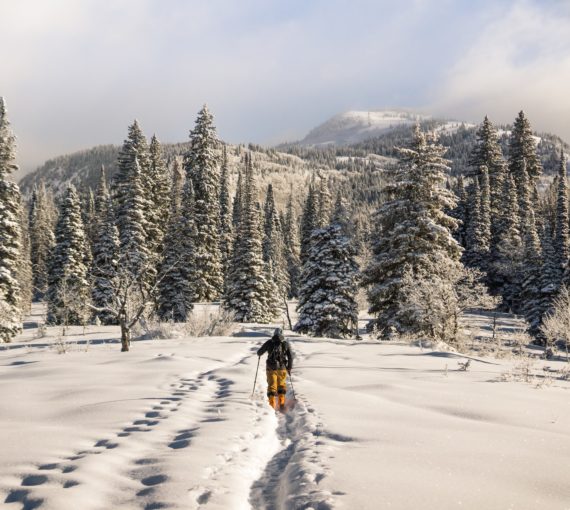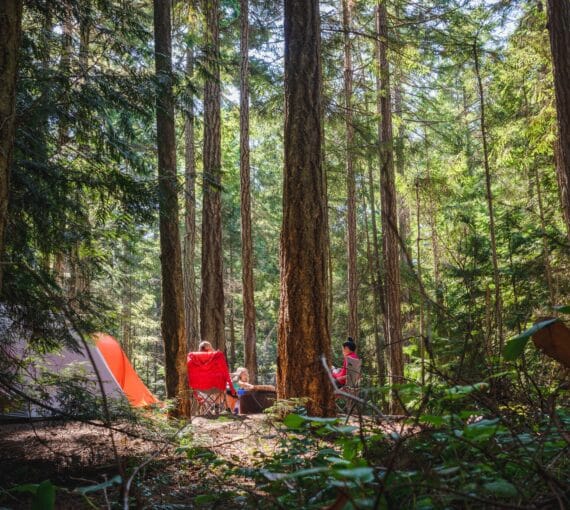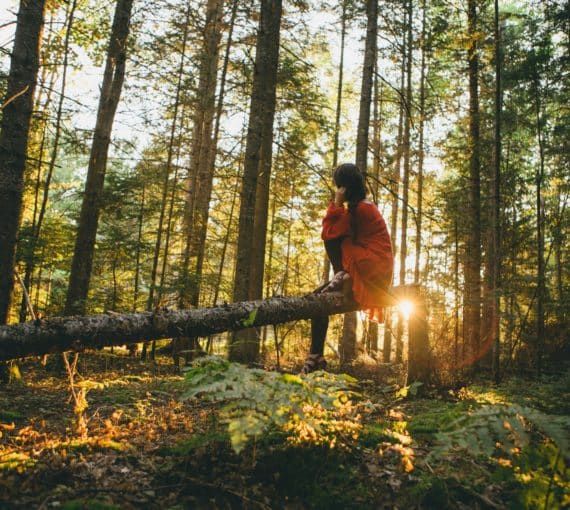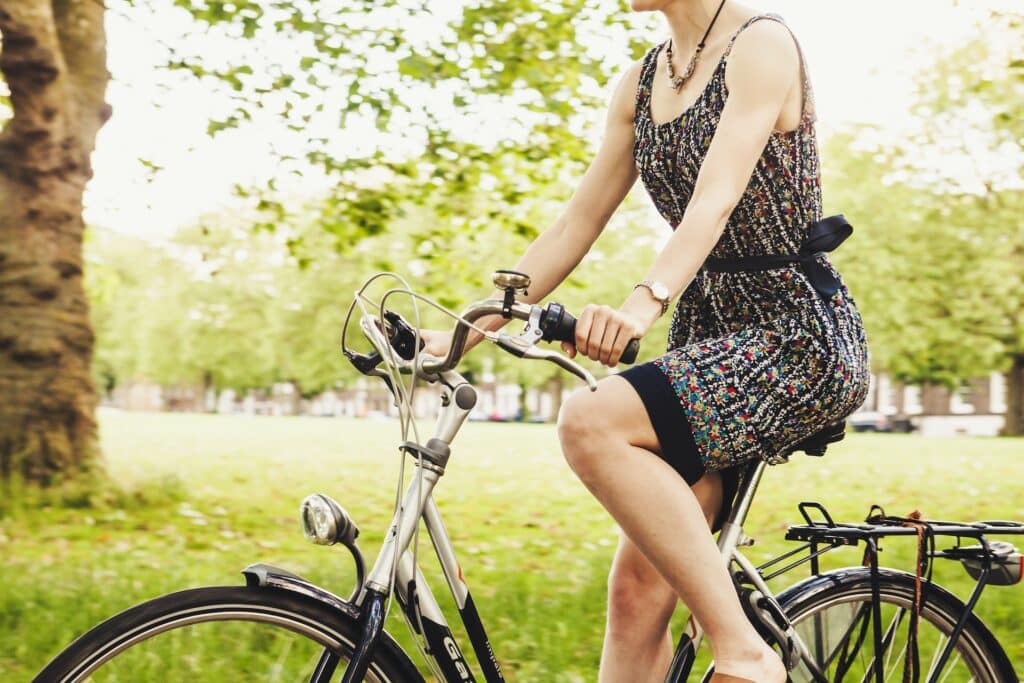
Take advantage of warmer weather by opting to cycle to your destination. An ecological and economical choice! (Photo: Blubel via Unsplash)
You don’t need to break the bank or book an extravagant trip to enjoy connecting with nature in summer. Plenty of options don’t require travel or splurging.
Summer activities
Looking for a new summertime activity? Want to revive a cherished childhood pastime?
Keep cool and active in water by swimming, surfing, kayaking, paddleboarding and canoeing.
If water sports are not your forte, or you don’t have access to a river, lake, outdoor pool or the ocean, organize a group for outdoor volleyball, disc freestyle, badminton, tennis, pickleball, basketball, soccer, softball or kickball. Grab a football or gloves and a baseball to toss around with a friend.
Games like spikeball and matkot are increasingly popular and easily played in a park or field. You can set up lawn bowling games like bocce or pétanque anywhere.
Try new hobbies! Hike. Run. Pick fruit and berries. Take up nature photography, fishing, bird watching, geocaching or orienteering. Walk outdoor mazes and labyrinths. Start skateboarding, inline or roller skating. Attend outdoor theatre and music events and street festivals.
Want to try a new sport? Check your local recreational centre or provincial sports association for outdoor sports fields and beginner programs and soccer, tennis, volleyball, disc freestyle, basketball, baseball, swimming or other lessons.
Summer is also a great time to start new green habits, hobbies and interests.
Support local businesses and the people who grow your food by attending farmers markets. Host an outdoor eco-friendly gathering. Try gardening. (Responsibly) enjoy an Earth-friendly wine or beer with friends on a patio or at a picnic. Start a food sharing club and dine together alfresco. Host a block party or car-free day (consult your municipality for rules about closing your street).
Budget-friendly equipment
- Organize a group for outdoor activities — together, you may already have all the equipment you need.
- Many parks and some private companies rent watersport equipment like paddleboards, kayaks and canoes.
- Join the sharing economy! “Buy nothing” groups offer free used equipment and gear. Consider donating or posting stuff you no longer want.
- People sell great quality second-hand equipment and gear in thrift and consignment stores or online marketplaces such as Kijiji, Craigslist or Facebook.
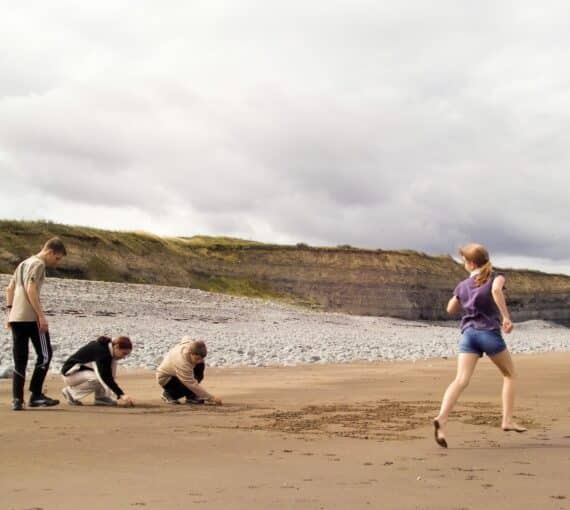
Tips for connecting with nature in spring and summer
Connecting with nature has a wide range of benefits for physical and mental well-being. Whether it’s strolling through a local park, walking the shoreline or sitting outside during lunch, exposure to nature has been linked to improved attention, lower stress, better mood, reduced risk of psychiatric disorders — even upticks in empathy and cooperation.
Want to explore the great outdoors?
Gather your family or friends and spend time in the great outdoors. You can visit many nature parks and trails free or for a small fee.
Want to go camping and discover if a night under the open sky is for you? Research opportunities near you by looking up national and provincial parks campsite availability. If you’re an experienced camper, check out backcountry campsites on federally or provincially owned “Crown” land where you can camp for free for up to 21 days.
Canada’s national and provincial parks are located on land that many First Nations, Métis and Inuit have cared for and lived on since time immemorial. Most “Crown” properties are on unceded land, which means that Indigenous title has neither been surrendered nor acquired by the Crown. Many Indigenous communities have unresolved land claims and assert their rights and stewardship over traditional territories, which may overlap with “Crown” land. Reclaiming Indigenous governance of unceded territory is part of the Land Back movement.
Wherever you spend time in nature, remember to not risk or undermine ecological integrity, cultural significance or impact the area negatively. Be mindful and respectful.
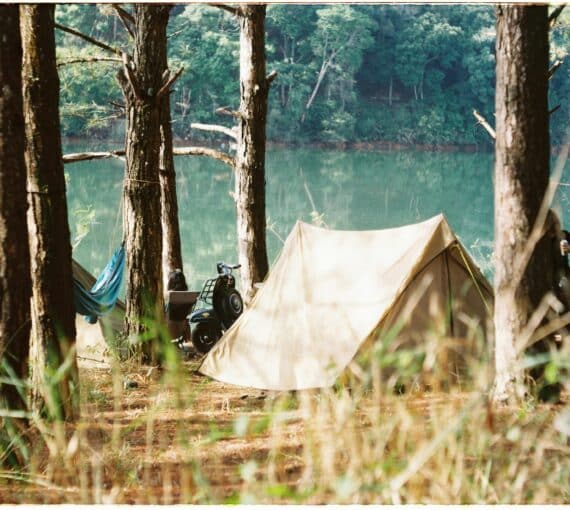
How to camp responsibly and sustainably
Camping is a great way to spend meaningful time in the great outdoors and connect with nature. But it comes with the responsibility of protecting the surrounding land, water and air.
Choose green transportation
Transportation accounts for one-quarter of Canada’s carbon emissions. Summer weather makes it easier to choose active, low-carbon ways of getting around. Greening your commute can significantly reduce your personal footprint.
- Going somewhere nearby? Walk, bike or roll to your destination.
- Use buses, trains, trams and/or subways when possible. Public transport reduces the number of cars on the road and is usually more energy efficient.
- Carpool or rideshare for further destinations. Coordinate with family, friends, colleagues and neighbours who have a similar route or destination.
- Choose electric or fuel-efficient vehicles. These produce fewer travel emissions.
Prepare for summer outdoors
- Stay hydrated. Choose a good re-usable water bottle instead of single-use plastic bottles.
- Use Earth-friendly sun protection. Protect your skin from harmful UV rays by using sunscreen free of harmful chemicals, including oxybenzone and octinoxate, which can harm marine life if washed off in water.
- Check your outdoor gear. Ensure you have the appropriate footwear, clothing and equipment and that all is in good working condition.
- Leave no trace. Leave nature as you found it, properly dispose of waste and respect wildlife and their habitats.
- Prioritize safety. Bring an emergency kit. Pack a map or save one on your mobile phone and ensure it’s fully charged before leaving. Check the weather report. Let someone know where you’re going.
Most importantly, have fun!

